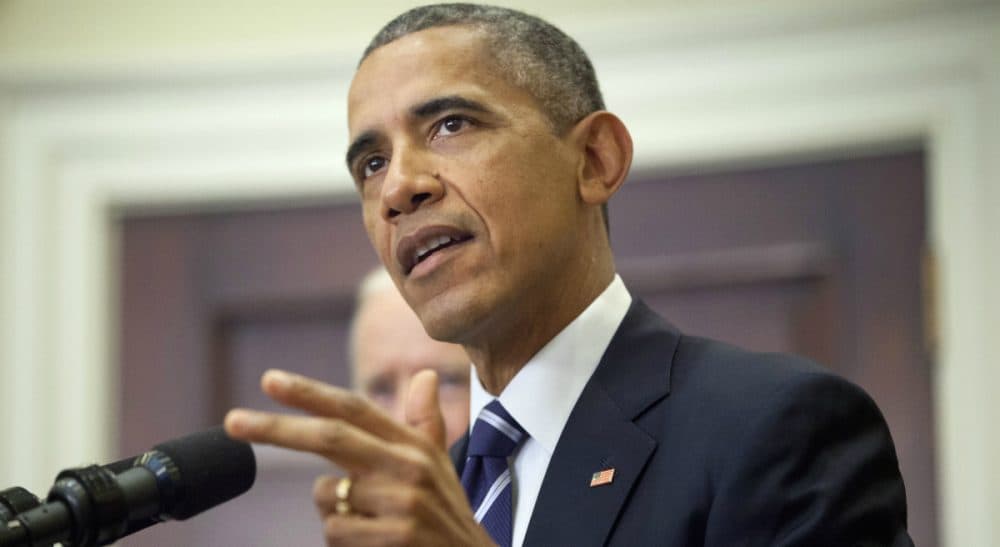Advertisement
Forget Keystone. Let’s Talk About Something That's Actually Worth Fighting For

A radio report last weekend about President Obama’s killing the Keystone XL oil pipeline featured environmentalists chanting thanks to the president in dull, zombie-like tones. How apt. It took a pliant zombie to get worked up, pro or con, over Keystone.
“The rejection of a single oil infrastructure project will have little impact on efforts to reduce greenhouse gas pollution,” The New York Times wrote. Indeed, the tar sands oil in Alberta, Canada that would have traveled the pipeline to the Gulf Coast is already being extracted, for shipment by rail or water (arguably less benign environmentally than a pipeline). Meanwhile, claims by the climate change-denying right that Keystone would have given badly needed jobs to half the country similarly were exaggerated -- camouflage for the “drill, baby, drill” mentality.
Unlike the symbolic rejection of Keystone, [the Clean Power Plan] has teeth. And as a regulation, it would bypass Congress and its Republican anti-environmentalists.
We’ve heard for years about what Obama called this “over-inflated” sideshow. So let’s talk about something really important that you may not have heard of: the Clean Power Plan. That will be the U.S. ante at the Paris climate conference beginning later this month. A regulation proposed by the Environmental Protection Agency under the Clean Air Act, the plan has two things going for it. Unlike the symbolic rejection of Keystone, it has teeth. And as a regulation, it would bypass Congress and its Republican anti-environmentalists. Alas, it may yet sink in the quicksand of anti-green fundamentalism.
The plan caps how much carbon dioxide emissions (almost one-third of our greenhouse gases) American power plants can vomit, mandating a 32 percent cut below 2005 levels by the year 2030. Hundreds of coal-powered plants would be shuttered, putting wind to the backs of clean energy sources such as solar power, and, well, wind. While imposing specific reductions on each state, the plan allows states to map their own paths to reaching those targets. And when you hear opponents carp about federal overreach, remember this: The plan only reinforces what states and the private sector are already doing.
According to The Times, “For more than a decade, carbon emissions from power plants have been declining — a result of a shift in energy generation from coal to cheap and abundant natural gas, regulation of other pollutants, like mercury, which has caused utilities to shut down older plants, and investments in cleaner fuels and energy efficiency. Coal generation, which 10 years ago provided just over half the nation’s electricity, last year provided 39 percent. Meanwhile, renewable energy sources like wind and solar power — driven by federal tax credits, improvements in technology and state mandates — have risen sharply during that time.” (Some conservatives whine about these green power government subsidies, forgetting that fossil fuels are subsidized, too.)
next year’s election could be a fatal setback if any of the number of anti-plan GOP candidates wins the White House.
But while congressional Republicans can’t vote on the Clean Power Plan, opponents are readying court challenges. There’s reason to hope these will fail. But foes also are encouraging states to sit on their thumbs instead of submitting compliance blueprints. Given that many states mindlessly rejected Medicaid expansion under Obamacare, they may play similarly obstructionist games here. Even if the Obama Administration hurdles all these obstacles, next year’s election could be a fatal setback if any of the number of anti-plan GOP candidates wins the White House.
In rejecting Keystone, Obama made the right decision if, as some environmentalists argue, killing the pipeline makes it harder to extract the oil, buying time for increasingly cheaper renewable energy sources to fill the energy void. But those environmentalists may be Pollyannaish, and even they would concede that much, much more needs to be done. Unlike Keystone, the Clean Power Plan is really worth fighting over.
